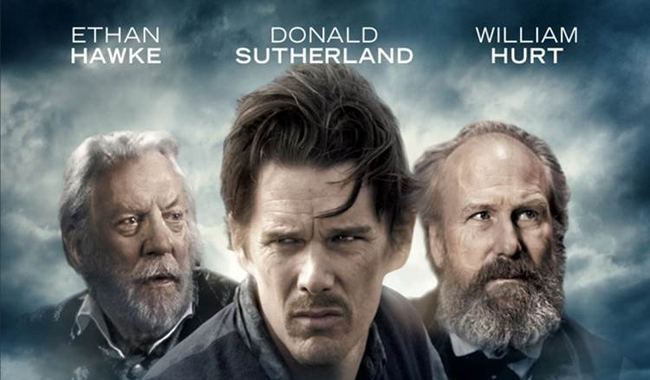
Moby Dick Review
 Encore Movie Network’s ambitions may not quite match Captain Ahab’s obsession with the white whale but the crew obviously had big plans for this three-hour miniseries.
Encore Movie Network’s ambitions may not quite match Captain Ahab’s obsession with the white whale but the crew obviously had big plans for this three-hour miniseries.
Almost everyone in the ensemble of actors looks familiar and there is no shortage of big names: William Hurt stars as Ahab, Ethan Hawke as his first-mate Starbuck. Gillian Anderson as Ahab’s wife and Donald Sutherland as Father Mapple do not get anywhere near enough screen time. Charlie Cox (of Stardust fame) plays Ishmael, the novel’s first-person narrator. Billy Boyd seems to have made it his mission to appear in as many period films about sailors as he can. In Moby Dick, he makes a brief appearance as Elijah, a clairvoyant oddball, who predicts doom for everyone on Ahab’s ship. Comparisons with Master and Commander come to mind – and not just because Billy Boyd looks pretty much the same in both. Jack Aubrey may not be quite as obsessed with catching the Acheron as Ahab is with catching Moby Dick, but there is a clear commitment to a truthful depiction of life on sea in both adaptations. Sadly, Moby Dick’s meticulously detailed sets look a bit too clean to seem realistic.
While the three-hour format allows the narrative to take its time introducing characters and setting up back-stories, it might have benefited from a number of edits. Gillian Anderson, hough always a delight, serves little purpose as Ahab’s wife, except as yet another voice of reason that Ahab conveniently ignores (he is after the beast that ate his leg, after all). The first instalment in particular struggles to gain momentum as the Pequod sails the seas for months without much happening. The gruesome and testosterone fuelled whale slaughter that concludes it won’t delight animal-lovers, vegetarians or feminists.
Moby Dick himself is perhaps the series’ greatest disappointment. Given that the white whale is both protagonist and Ahab’s nemesis, great care should have been taken with his portrayal. But the effects just aren’t up to it and leaving more of it up to the viewer’s imagination might have been the better call. This unconvincing CGI-generated abnormality is a far cry from “the great demon” of the sea, the “deadliest evil” that the sailors see in Moby Dick – a shortcoming that diminishes what otherwise could have made for a powerful conclusion to the first act.
The second instalment is stronger than the first, successfully depicting the increasing claustrophobia on board the Pequod after months on sea and the rising tension between Ahab and some of his crew, most notably his first mate. William Hurt unsurprisingly dominates as Ahab and it is hardly Ethan Hawke’s fault that Starbuck doesn’t come off quite so well: direction and edit simply give him too many glowering looks in favour of the character’s conflict between filial love for his captain (his words, not mine) and the realisation that Ahab is on a suicide mission. And while Ahab’s character is believable in his madness, Ishmael and the others aren’t quite so. Their motivation for following Ahab even as he obviously descends into insanity never becomes quite clear or convincing.
And again, episode two drags too much. As the minutes tick by, viewers may be inclined to wonder whether the grand finale will ever arrive at all. When it does, it’s over too quickly and overblown almost to the point of silliness.
With no extras to support it, the series may be a worthwhile introduction to the Melville classic for those who prefer a DVD to a book, but for film buffs or lovers of literature it probably won’t quite do the trick.
The production’s detail is impressive, Nigel Williams’ effort at making Melville’s classic tale palatable for a modern audience well-intentioned. However, the material hasn’t aged well; much of it will sit uneasily with a modern audience and next to other successful literary adaptations of similar formats, Moby Dick cannot quite hold its own.
Anne Korn
